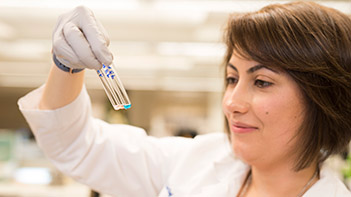Clinical Pathology
Comprehensive Testing and Consultations
 The Division of Clinical Pathology manages Beth Israel Deaconess Medical Center's clinical laboratories that provide comprehensive testing and consultations:
The Division of Clinical Pathology manages Beth Israel Deaconess Medical Center's clinical laboratories that provide comprehensive testing and consultations:
Clinical chemistry is a comprehensive laboratory, performing well over 100 different assays. Using a wide variety of techniques, we are equipped to measure anything from acetone to zinc.
Laboratory Components
The laboratory includes:
- Work areas dedicated to blood gas analysis
- Highly automated spectrophotometry, allowing the simultaneous quantitation of dozens of chemical constituents of blood
- Therapeutic drug monitoring and toxicology
- Automated immunoassays for endocrinology and tumor markers
- Protein electrophoresis and immunofixation electrophoresis
- Immunoassays for hepatitis and related serologies
- Prenatal screening
- Fetal lung maturity testing
- Urinalysis
Clinical microbiology is the diagnosis of infections by bacteria, viruses and parasites. The Microbiology Laboratory provides a broad array of diagnostic tests used for diagnosis of infections caused by bacteria, viruses, and parasites by performing:
- Blood cultures
- Gram stains
- Bacteriologic cultures
- Antibiotic susceptibility testing
Antibiotic Susceptibility Testing
Antibiotic susceptibility testing guides clinicians in the choice of appropriate antibiotic therapy. The availability of rapid and accurate antibiotic susceptibility testing methods provides crucial information in an age when many organisms have developed antibiotic resistance.
Parasite Detection
Parasite detection is performed using both light and fluorescent microscopy.
Viral Identification
Virus identification is accomplished using tissue culture, immunofluorescence, and molecular diagnostics techniques. A variety of immunoassays are used to measure the humoral antibody response to infectious diseases and to detect microbial antigens in the bloodstream.
Molecular Diagnostic Testing
Molecular diagnostic testing began in 1995 with the implementation of Chlamydia trachomatis detection by polymerase chain reaction (PCR). Since this time, this diagnostic area has been rapidly expanding.
Viral Load Testing and Genotyping
Included among currently available assays are viral load testing for Human Immunodeficiency Virus (HIV), Hepatitis C Virus (HCV), Hepatitis B virus (HBV) and Cytomegalovirus, and HCV genotyping.
Qualitative PCR Testing
We also offer qualitative PCR testing for Neisseria gonorrheae detection and are in the process of converting most of our nucleic acid amplification assays to more advanced real time PCR technologies.
The Cytogenetics Laboratory provides chromosome analysis, fluorescence in situ hybridization (FISH) and oligo-SNP chromosomal microarray for constitutional disorders and acquired neoplastic disorders. In addition, the laboratory can establish cell cultures to be sent out for molecular testing.
The Cytogenetics Laboratory will extend the service to provide critical chromosome breakage testing for Fanconi Anemia by May 1. The test validation and workflow logistics are near completion and we will contact all clients once the go-live date is confirmed. For providers within the BILH network, please find additional information about this particular service in the EPIC procedure catalog. For providers outside the BILH network, please refer to the link below to access additional information about sample submission and the test requisition.
- Fanconi Test Lab Req
- Fanconi blood submission instructions
- Fanconi fibroblast submission instructions
- Fanconi billing and CLIA information
For more information, email Annie Cheng or call 617-667-1456.
Cytogenetics Contacts
Director:
Ulrike Kappes, MD, PhD
Email
617-667-3675
Pager: 35420
Clinical Manager:
Annie Cheng, BSC, ASCP (M,SV)
Email
617-667-1456
Pager: 32485
Clinical Supervisor:
Zi Wang, ASCP(CG)
Email
617-667-3403
Pager: 33299
The Hematology Laboratory performs:
- Automated and manual blood counts and differential counts on white blood cells
- Flow cytometry for surveillance of immunological status and classification of leukemias and lymphomas
- Routine and reference coagulation testing
- Many other specialized tests
Like the clinical chemistry lab, the hematology lab's responsibilities overlap with those of the critical care labs.
Assays for Patient Care
Although we have incorporated many aspects of molecular diagnosis into existing laboratory areas, there remains a role for a separate laboratory facility that specializes in more basic approaches. It is often necessary to perform assays for patient care which are not sufficiently automated for performance in the core laboratory.
Provides Important Resources for Residents and Fellows
This facility provides not only a useful interface between the world of patient care and that of basic pathology research, but also an important resource for the training of Pathology residents and Pathology fellows.
Laboratory Focus
Currently, the laboratory focuses on:
- Polymerase chain reaction (PCR) to identify clonal rearrangements of either T-cell receptor or immunoglobulin genes.
- Human Papilloma Virus (HPV) capture assays to evaluate PAP smears from patients at risk for cervical carcinoma.
- in situ hybridization for Epstein-Barr Virus (EBV) in lymphomas.
- PCR to identify the Factor V and prothrombin mutations responsible for hypercoagulability leading to vascular thrombosis in a significant number of patients.
Laboratory Components
Transfusion medicine includes:
- Blood crossmatching and preparation of blood components.
- Donor room for collection of whole blood and platelets.
- Histocompatibility laboratory to support the hospital's transplantation services.
- Active transfusion medicine consultation service to evaluate patients with special transfusion needs, such as therapeutic plasma exchange and cytapheresis.
Blood Bank
The blood bank performs diagnostic tests, but its main role is to see that blood products are administered safely and appropriately.
Products issued by the blood bank include:
- Packed red cells
- Fresh frozen plasma
- Platelets
Laboratory Statistics
Beth Israel Deaconess Medical Center performed over 100 transplants in recent years (including kidney, liver and pancreas). The Histocompatibility Laboratory performed approximately:
- 400 typings for HLA-A,B and C
- 300 typings for HLA-DR
- 300 compatibility tests
- 100 panel reactive antibody determinations
Molecular methods for HLA typing will be added to the laboratory's testing array in the near future.
